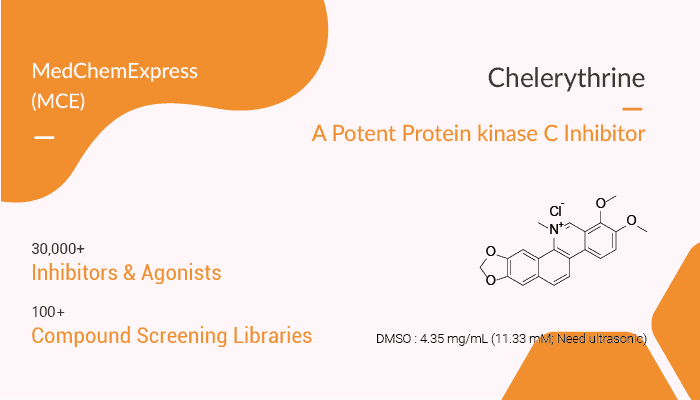Chelerythrine is a natural benzo[c]phenanthridine alkaloid. It extracts from a number of plant species, such as Chelidonium majus, Macleaya cordata, Sanguinaria canadensis, etc. This compound exerts a wide spectrum of biological activities, including anti-cancer, anti-diabetes, anti-fungus, as well as a protective effect against the ethanol-induced gastric ulcer and the lipopolysaccharide-induced endotoxic shock, etc.
The anti-cancer effect of Chelerythrine has been studied both in vitro and in vivo. Most of the current anti-cancer study of Chelerythrine focused on its ability for induction of apoptosis, a type I programmed cell death.
In this article, we will introduce an anti-cancer agent Chelerythrine.
Chelerythrine is a potent and selective antagonist of the Ca++/phospholopid-dependent protein kinase (Protein kinase C: PKC).

Protein kinases play crucial roles in signal transduction, cellular proliferation, and differentiation, but the pleiotropic effects of these enzymes in cellular regulation and their involvement in tumor promotion underscores the importance of understanding their mechanism of regulation.
Chelerythrine inhibits the PKC activity with an IC50 of 0.66 μM. It interacted with the catalytic domain of PKC, is a competitive inhibitor with respect to the phosphate acceptor (histone IIIS) (Ki = 0.7 microM), and a non-competitive inhibitor with respect to ATP.
Moreover, Chelerythrine is also an inhibitor of BclXL-Bak Bcl-2 homology 3 (BH3) domain binding with an IC50 of 1.5 μM and displaces Bax, a BH3-containing protein, from BclXL. This compound triggers apoptosis through a mechanism that involves direct targeting of Bcl-2 family proteins.
Chelerythrine can also induce autophagy in non-small cell lung cancer (NSCLC) cells. It also induces cell viability decrease, colony formation inhibition, and apoptosis in a concentration-dependent manner. In addition, Chelerythrine triggers the expression of phosphatidylethanolamine-modified microtubule-associated protein light-chain 3 (LC3-II).
In conclusion, Chelerythrine is a potent PKC inhibitor. It can be used for tumor research. And Chelerythrine also induces apoptosis and autophagy.
Reference:
Herbert JM, et al. Biochem Biophys Res Commun. 1990 Nov 15;172(3):993-9.
Tang ZH, et al. Redox Biol. 2017 Aug;12:367-376.
Chan SL, et al. J Biol Chem. 2003 Jun 6;278(23):20453-6.